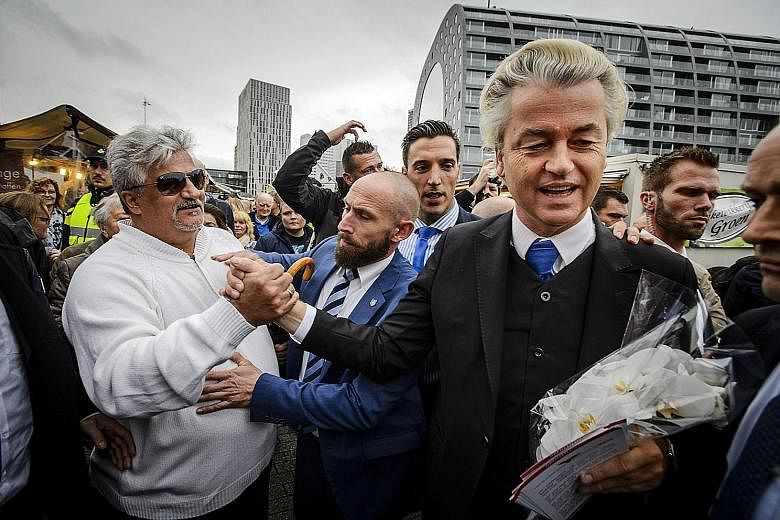AMSTERDAM • Campaigning for the Dutch election began yesterday, with anti-Islam Party for Freedom leader Geert Wilders a front runner in a vote which will test the anti-establishment sentiment that swept Britain out of the European Union and Mr Donald Trump into the White House.
Mr Wilders, a Eurosceptic, anti-immigration fan of President Trump, has dubbed the March 15 parliamentary election the start of a "Patriotic Spring" in Europe - with French and German voters going to the polls in May and September.
Unlike Mr Trump's win and the Brexit vote, it will not be a shock if Mr Wilders and his Party for Freedom (PVV) win - he has led in opinion polls for most of the past two years, and the fragmented political landscape means that a coalition government of four or more parties is all but inevitable.
His main rival, Prime Minister Mark Rutte of the conservative People's Party for Freedom and Democracy (VVD), is banking on a strengthening economic recovery to restore popularity lost during the austerity years of 2012 to 2014.
-
20%
Expected percentage of the popular vote for Mr Wilders' party
16%
Expected percentage of the popular vote for PM Rutte's party
Mr Wilders' PVV is expected to get 20 per cent of the popular vote, compared with 16 per cent for Mr Rutte's VVD. A simple majority of just over half is generally sought to govern. However, all but one party have ruled out sharing power with Mr Wilders, whose policies are seen by many as offensive and, sometimes, unconstitutional.
There are more than two dozen parties competing for votes, with 14 likely to win at least one seat in the 150-member Dutch Parliament. The next three largest parties command no more than 10 per cent or 11 per cent of the vote.
-
WHO'S WHO IN DUTCH POLITICS
More than two dozen parties and 1,114 candidates will compete in the Dutch elections next month, chasing 150 seats in the lower house of Parliament. In this system of proportional representation, even the smallest parties can play an outsize role as kingmakers in building a 76-seat majority. Here is a who's who guide:
FAR-RIGHT, ANTI-ISLAM, ANTI-EU
With his Party for Freedom (PVV) topping the polls, leader Geert Wilders is eyeing the premiership but many say they will not work with him.
Campaign theme: "Reclaim The Netherlands For Us". He has vowed to bar Muslim immigrants, close mosques, ban sales of the Quran and quit the EU. Poll position: First, with 25-31 seats.
LIBERAL PARTY
Led by Prime Minister Mark Rutte, the People's Party for Freedom and Democracy (VVD) leans towards the right on the economy but is more progressive on social issues. Founded in 1948, it has been the ruling coalition partner in two successive governments since 2010.
Campaign theme: "Act. Normally". Despite positioning itself as the party of the status quo, Mr Rutte has hardened his tone and recently told immigrants they should respect the country's rules "or leave". Poll position: Second, with 22-26 seats .
PROGRESSIVE AND PRO-EUROPEAN
D66 is the Democracy party founded in 1966. Campaign slogan: "Together Stronger. Chances For Everyone", stressing education and jobs.
Poll position: Joint third with the Christian Democratic Appeal, with 14-18 seats.
THE CENTRIST
The Christian Democratic Appeal (CDA) was founded in 1980. It has long held an important place in Dutch politics but as the country has become more secular, support has waned.
Campaign slogan: "Choice For A Better Netherlands". Its themes revolve around a strong society and the family.
ECOLOGIST
Founded in 1990, the GreenLeft party is led by Mr Jesse Klaver, who at 30 years old is the country's youngest party leader. It has drawn increasing support particularly among young voters.
Campaign theme: "Time For Change". Poll position: Fourth, with 13-17 seats.
SOCIALISTS
Founded in 1972, the Socialist Party is anti-EU.
Campaign slogan: "Seize The Power". Has called for a fight against poverty, an increase of the minimum wage and the abolition of the European Commission. Poll position: Fifth with 12-16 seats .
LABOUR
Founded in 1946, it is the junior party in the outgoing coalition.
Campaign slogan: "Forward Together". It has been campaigning on jobs, better housing, health and education. It has sought to reposition itself on the left, but lacks credibility after years in government. Poll position: Sixth, with 11-15 seats.
AGENCE FRANCE-PRESSE
"The overwhelming majority of Dutchmen basically would not vote for (Mr Wilders)," said Radbout University in Nijmegen assistant professor Kristof Jacobs.
So a victory for Mr Wilders is unlikely to lead to the Netherlands leaving the European Union, closing its border to Muslim immigrants, or reinstating the Dutch currency - policies that only his party endorses.
Last December, Mr Wilders was convicted of inciting discrimination against Moroccans for leading a chant of "Fewer! Fewer! Fewer!" at an election rally in 2014.
If Mr Wilders' PVV finishes first but is unable to form the government, Mr Rutte will be left trying to forge a centrist coalition with several parties that share little more than opposition to Mr Wilders. In that case, "we will stay put and manage the country until there is a new coalition", Finance Minister Jeroen Dijsselbloem said on Tuesday.
The Netherlands, a country of 17 million people that relies heavily on foreign trade, rejected the European Constitution in 2005. It last year also voted down a treaty for closer EU ties with Ukraine.
A poll by Motivaction on Tuesday showed over 61 per cent of respondents see Dutch politicians as "elitist, unreliable and dishonest", while about 37 per cent said they were undecided about their votes. "I find it difficult to make a decision," said Ms Renee Keijzer, from the town of Volendam. "So much has happened in the world that it is hard to position yourself properly."
REUTERS

